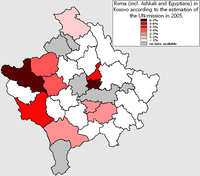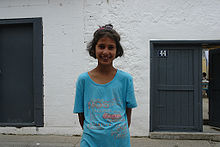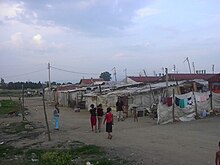 Romani in Kosovo according to the estimation of the UN-mission in 2005 Romani in Kosovo according to the estimation of the UN-mission in 2005 | |
| Regions with significant populations | |
|---|---|
| Pristina, Gjakova, Ferizaj, Vushtrri, Kosovo Polje, Mitrovica and Peja | |
| Languages | |
| Balkan Romani, Albanian, Serbian | |
| Religion | |
| Christianity, Islam |
Romani people in Kosovo (Albanian: Romët në Kosovë) are part of the wider Romani people community, the biggest minority group in Europe. Kosovo Roma speak the Balkan Romani language in most cases, but also the languages that surround them, such as Serbian and Albanian. In 2011 there were 36,694 Romani, Ashkali and Balkan Egyptians living in Kosovo. However, the minorities are unrelated to each other and were only put together based on appearance.
Many Romani were targeted by the Kosovo Liberation Army along with Serbs during the Kosovo War as they were considered to be allied with Serbs and Serbian national interests. Romani in Kosovo are much depleted from their former numbers, and have been in both stationary and nomadic residence there since the 15th century. The Kosovo Liberation Army were reported to have expelled 50,000 Romani from Kosovo, forcing them to take refuge in central Serbia, but many of them have since returned to Kosovo.
Subgroups

As in other parts of the Balkans, the denomination of Romani has always been subject to outside pressure. In the official census, the label Romani is used officially by the state.
|
Serbian Romani:
|
Polylingual:
|
Albanian Romani:
|
Other:
|
Political representation
Four seats in the Assembly of Kosovo are reserved for parties representing the Romani, Ashkali and Balkan Egyptian communities.
Romani political parties in Kosovo
Education
Formal education is of a poor standard, especially among women, due both to native beliefs that formal education is unnecessary, and to discrimination in education in the formal schools who are ill-equipped for the needs of Romani children. Serbianising and Albanizing tendencies have also led to the Romani sliding from the educational mainstream. Third-level education is not attained by the majority of Roma.
Discrimination

Following the cessation of the Kosovo war in June 1999 and the subsequent return of ethnic Albanians from abroad, approximately four fifths of Kosovo's pre-1999 RAE population had been expelled from their homes. Many Kosovo Albanians regarded the Roma as having collaborated with the Yugoslav Army. Roma were claimed to have assisted the Serbian police in plundering Albanian homes and shops to supply the military action, and in burying the Albanian dead. According to Roma accounts, the Yugoslav authorities coerced them into providing assistance. Many Roma were also recruited into the Yugoslav Army to "help terrorise Albanians" and Roma homes were marked with an "R" on their doors to distinguish them from Albanian houses when the Serbian paramilitaries arrived to plunder.
Albanians regarded these acts as further evidence that Roma had allied themselves with the enemies of the Albanian nation, and thus many Roma were targeted by the returning Albanians. The departure of the Yugoslav army and police was followed by a series of "retaliatory attacks". By June 1999, the Romani mahala of Mitrovica was burned down and the inhabitants fled. Around 3,500 Roma took shelter in a school in Kosovo Polje following threats and the Roma community of Gjakova were warned to leave their homes. The Romani quarter of Brekoc in Gjakova and Arbanë in Prizren were also burned down. German KFOR troops also discovered 15 severely beaten Roma, accused of taking part in looting and collaborating with the Serbs, in a police office in Prizren that was being used by the KLA as a prison. 5,000 displaced Roma gathered in a KFOR built camp in Obiliq where they were subject to insults and attacks by Albanians.
Romani in Kosovo today live in constant fear of further ethnic unrest. Romani displaced in North Kosovo are today housed in lead-infested camps in North Mitrovica. There is ongoing campaign for rehousing and proper health provisions for the families affected, and a fatality estimate ranges from 27 to 81.
Today, persecution of members of these Roma communities continues, manifested in their systematic exclusion from access to fundamental human rights. Racial discrimination against RAE communities in Kosovo is pervasive, depriving tens of thousands of their dignity. Anti-Gypsy sentiment among the ethnic Albanian majority is widespread. Today, RAE and others considered Gypsies in Kosovo live in a state of pervasive fear, fostered by routine intimidation, verbal harassment, and periodic racist assaults.
— German Law Journal analysis on the status of the Roma
Mitrovica camps
Main article: Roma in United Nations refugee camps, MitrovicaReturning IDPs were housed by UNMIK in North Mitrovica in a lead mine site, and 27 died of lead poisoning.
See also
References
- "The Roma community in Serbia : Serbia : Eastern Europe : Where we work : CAFOD". Archived from the original on 2007-10-20. Retrieved 2007-10-17.
- Roma and the Kosovo conflict
- "IFES Election Guide | Elections: Kosovo Parliament 2019". Electionguide.org. Retrieved 2019-10-16.
- Cahn 2007, pp. 82.
- ^ Cahn 2007, pp. 83.
- Kenrick 2007, pp. 144.
- "BBC News:Kosovo gypsies under threat".
- Kenrick 2007, pp. 145.
- "Eyewitness: Disarming the KLA".
- See also Viewpoint (Council of Europe, Commissioner for Human Rights): European migration policies discriminate against Roma people by Thomas Hammarberg, 22/02/10
Sources
- Cahn, Claude (2007). "Birth of a Nation: Kosovo and the Persecution of Pariah Minorities" (PDF). German Law Journal. 8 (1): 81–94. doi:10.1017/S2071832200005423. ISSN 2071-8322. S2CID 141025735. Archived from the original (PDF) on 15 February 2015.
- Kenrick, Donald (2007). Historical Dictionary of the Gypsies (Romanies). Scarecrow Press. ISBN 9780810864405.
External links
- Who we Were, Who we Are: Kosovo Roma Oral History Collection. The most comprehensive collection of information on Kosovo's Roma in existence. (English)
- "Romano Them/Chachipe". Romano Them/Chachipe. Retrieved 28 August 2017.
- "The Roma and "Humanitarian" Ethnic Cleansing in Kosovo". Dissidentvoice.org. Retrieved 28 August 2017.
- Roma, Voice of. "Voice of Roma". Scn.org. Retrieved 28 August 2017.
- "BBC NEWS - World - Europe - Kosovo Roma to quit toxic UN camp". News.bbc.co.uk. Retrieved 28 August 2017.
- "The Patrin Web Journal - Roma of Kosovo: the Forgotten Victims". 26 October 2009. Archived from the original on 26 October 2009. Retrieved 28 August 2017.
{{cite web}}: CS1 maint: bot: original URL status unknown (link) - "Kosovo Roma refugees, Kumanovo". Stopnato.org.uk. Retrieved 28 August 2017.
- "Breaking News, World News & Multimedia". The New York Times. Retrieved 28 August 2017.
| Ethnic groups in Kosovo | ||
|---|---|---|
 | ||
| Romani people in Europe | |
|---|---|
| Sovereign states |
|
| States with limited recognition | |
| Dependencies and other entities | |